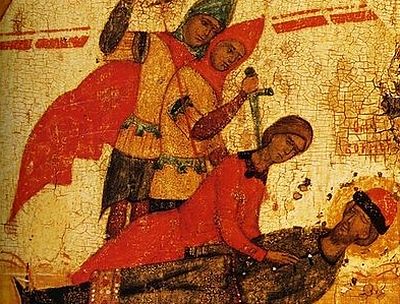
The Holy Brothers Boris and Gleb, in Baptism – Roman and David, sons of the  Equal-to-the-Apostles St. Vladimir, and the Baptism of Rus’
Equal-to-the-Apostles St. Vladimir, and the Baptism of Rus’
“>Equal-to-the-Apostles Prince Vladimir, the Baptizer of Rus, are the first canonized Russian saints. They were glorified by the Russian Church even before their father and before their great-grandmother, the  Holy Equal-to-the Apostles Olga“>Equal-to-the-Apostles Princess Olga were. In church prayers, they are called passion-bearers, meaning those who endured suffering, as they were brutally murdered in 1015 by their half-brother Sviatopolk, who sought to eliminate “competitors” in the struggle for the Kiev throne.
Holy Equal-to-the Apostles Olga“>Equal-to-the-Apostles Princess Olga were. In church prayers, they are called passion-bearers, meaning those who endured suffering, as they were brutally murdered in 1015 by their half-brother Sviatopolk, who sought to eliminate “competitors” in the struggle for the Kiev throne.
Prince Vladimir, while still a pagan, had several wives and numerous concubines, from whom he had a total of 12 sons. After becoming a Christian, Vladimir repented of his polygamy and remained married to only one wife, the Byzantine princess Anna. Nevertheless, all his sons were considered legitimate heirs. At that time in Rus, the throne passed not from father to son but from brother to brother by seniority. Thus, all of Prince Vladimir’s sons were to rule Kiev in turn after his death. However, one of the heirs, Svyatopolk, after taking the throne following his father’s death, decided to kill all his brothers and keep Kiev for himself and his descendants.
The death of Prince Vladimir and the capture of Kiev by Svyatopolk found Prince Boris on a campaign against the Pechenegs. He had gathered a significant army, and his retinue suggested Boris go to Kiev against his brother and take the throne himself. But Boris categorically refused to shed his brother’s blood, recognizing Svyatopolk as the legitimate ruler. The retinue, eager for war and military spoils, abandoned their prince, leaving Boris with a small squad of loyal men. The assassins sent by Svyatopolk heard Boris singing psalms in his tent and attacked him when he went to sleep. They took him, still alive, to Kiev and finished him off on the way.
The young Gleb followed his brother’s example—he did not raise the banner of fratricidal civil war and was also killed on Sviatopolk’s orders.
Such an act—sacrificing oneself for the sake of not participating in fratricidal strife—was incomprehensible to the newly baptized Rus, making the Christian feat of Boris and Gleb even more grand and astonishing. With their death, they showed that the Russian soul now had a moral law stronger than the thirst for power, stronger than blood vengeance, and even stronger than death itself.
Miraculous healings began to occur at the graves of the holy brothers, further testifying to their sanctity.  What is the Meaning of Passion-bearing?The holy, right-believing Prince-Passion-bearers Boris and Gleb were the first saints to be canonized in Rus’. Despite this, many Christians, and especially in our time, do not understand the meaning of their podvig. And really, where is the virtue in being meekly killed? Deacon Valery Dukhanin, Fr. Dimitry Shishkin, and Archpriest Artemy Vladimirov speak about the meaning and importance of the podvig of the holy princes and the last Russian tsar.
What is the Meaning of Passion-bearing?The holy, right-believing Prince-Passion-bearers Boris and Gleb were the first saints to be canonized in Rus’. Despite this, many Christians, and especially in our time, do not understand the meaning of their podvig. And really, where is the virtue in being meekly killed? Deacon Valery Dukhanin, Fr. Dimitry Shishkin, and Archpriest Artemy Vladimirov speak about the meaning and importance of the podvig of the holy princes and the last Russian tsar.
“>Passion-bearers Boris and Gleb were canonized in 1072, less than 60 years after their death, which is very rare; usually, saints are glorified after centuries. In icons, they are depicted with weapons in their hands, but their swords are sheathed, and in their right hand, they hold the new symbol of Rus – the Christian cross. They had weapons, retinues, and the opportunity not only to defend themselves but to attack. They could have, like their half-brother, the Novgorod Prince Yaroslav, engaged in armed struggle with the usurper, but they chose to shed only their own blood. It turns out one can also be a victor—not here on earth, but in eternity.
There are no surviving portraits of Boris and Gleb, but ancient Russian iconographers depicted them as resembling Greeks. This reflects both imitation of Byzantine iconography, as Orthodoxy and iconographic traditions were received from Byzantium, and the fact that the holy brothers were half-Greek by blood, as their mother, Princess Anna, was the sister of Emperors Basil and Constantine.
Holy passion-bearers, Boris and Gleb, help us!